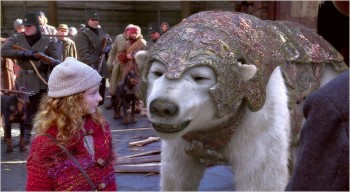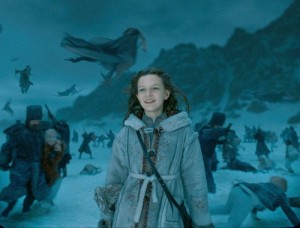|
The Catholic church could do the world a mighty big favor and shut the hell up once in a while. The Golden Compass, first in the His Dark Materials trilogy of novels, was incurring a chorus of whining from the pointy hat brigade, as is typical in these cases, before they'd ever seen the film in question. For an institution supposedly based on a rock-solid foundation of faith, they certainly do seem awfully squirmy every time anyone suggests that they might be in error. I don't remember the secular community rising up in fury and protest in response to the blatantly pro-Christian The Chronicles of Narnia film, or even the grotesque torture fest that was Mel Gibson's The Passion of the Christ. However, our stalwart defenders of dogma must send out the rallying cry over a film that has the audacity to, in their words, introduce children to atheist ideas. Oh no. The horror. In this typically bigoted intolerance, the church has managed, however unintentionally, to almost perfectly vindicate what they consider to be an unflattering portrayal of their institution in the film, where they are seen as an authoritarian body that will accept no contradiction to their own perception of the truth. Way to go, popers!  Unlike many escapist fantasies, the His Dark Materials series is actually about something, pitting allegiance to dogma against free and open inquiry, delightfully siding-for once, it seems-with science. Set in a parallel world resembling earth of a few hundred years ago, the conflict arises over the apparent discovery of a substance called 'dust,' which the chur-er, I mean Magisterium, considers to be heresy. Defying the powerful institution's opposition to the study, the scholar Lord Asriel receives funding and backing to journey northwards and investigate the phenomena. Amidst a series of unexplained child abductions, his niece Lyra decides to follow him to the land of the Ice Bears and, in so doing, runs afoul of all sorts of trouble and meets the requisite cast of colorful chracters, including perennial cowboy Sam Elliot, who is apparently incapable of appearing in films without that hat. It would seem that the book, which I've not read, is rather densely filled with world-building and elabrate theories and chracter relationships, which means that in a film pared down to under two hours, things can tend to get rushed a bit. This movie does expect and/or require you to pay attention, and being that this is America, which is apparently full of people who actually thought that Pirates of the Carribean: At World's End was too complex to follow, the filmmakers might be asking a lot of the average attendee. Many ideas are only established once in relatively brief scenes, and others, admittedly, are somewhat under-explained. There are some witches in the story, whose precise role in this world isn't very clear. They seem to pop in and out in rather sporadic scenes when the plot requires them, bypassing the general questions of "Who are you?" and "How did you know to show up at this particular moment?" with casual insouciance presumably befitting witches. The occasional critic has accused the film, as critics so often do, of playing up effects (as if a fantasy film could really omit them without junking tons of the original story) and action in place of plot detail and character development. One might, however, just as easily accuse a conversely weighted film of shirking action and exciting scenes in favor of even more exposition and talky bits in a film that already has quite a lot of them. When one considers that a large portion of the expected audience will be young, this wouldn't seem very advantageous. Though reportedly downplayed from the source novel, the anti-Catholic stance still comes across clearly enough, largely through the film's design sense, with the Magisterium officials and their headquarters sporting rather familiarly preistly and Vatican-esque designs, respectively. One also imagines sheer legions of insufferable fundamentalists cringing in horror at the fact that the characters' souls, seen as sentient animal symbiots, are known as "daemons." If you happen to be Catholic or religious in general, I would simply suggest that instead of automatically defensively backing into a corner and deploying claws over the presence of doctrinal criticism, try asking yourself if perhaps the criticism is, in fact, valid. There are worse things to do in life than asking honest questions. 
The overall cast is stellar, ranging from newest and best Bond Daniel Craig and his co-star Eva Green to both the wizards from Lord of the Rings (one whose face is never seen, and one whose face is barely seen), and featuring Nicole Kidman as a so-proper-she-must-be-unhinged woman of the sort Kidman seems destined to play until the grave, owing, perhaps, to her ability to play them with the sort of comfort that suggests there's minimum of actual acting going on. There's also, you know, some kids, and while child actors rarely make a great impression on me, I can at least say that I didn't find them annoying. And while it's almost meaningless to make much hoopla over effects anymore, what with genuinely crappy effects being such a rarity nowadays, I'll give a special nod towards the polar bears featured in the film, for effectively conveying the sense of a real animal, and a big, ferocious one to boot. Clearly wanting to recapture the success they had with Lord of the Rings, New Line has presented a film which is so clearly the first in a series that its own ending is a tad underwhelming (and apparently rather premature, stopping well before the end of the book), ultimately giving us a total experience which feels somewhat less than total. One hopes that perhaps this film will also be given the "Extended Edition" treatment, and some of the sketchier bits filled in. Still, while not quite a spectacular experience, it's a fun one that still manages to get in some decent and, for a kids' film, little-discussed ideas, and for that, I'll gladly see the next one. Still, it wouldn't have killed the writer of that closing song to come up with something other than just repeating the name "Lyra" a trillion times before getting around to the actual lyrics. -review by Matt Murray
|
|
||||||||